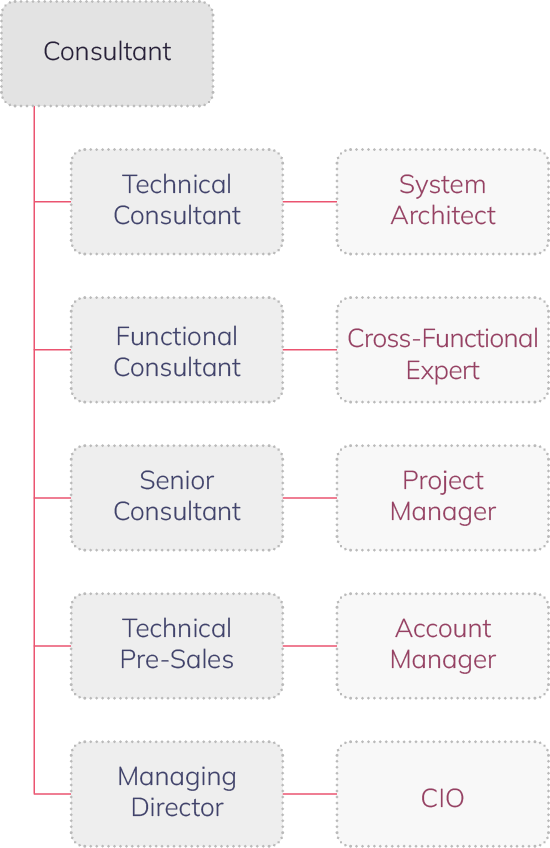
NetSuite Consultant

NetSuite Consultant
NetSuite Consultant
How much do Consultants make?
Functional/Implementation Consultant
| 0-2 years | 3-6 years | 7-10 years | |
|---|---|---|---|
| United States ($) | |||
| Canada (C$) | |||
| United Kingdom (£) | |||
| Australia (AU$) |
| United States ($) – 130,250 |
| Canada (C$) – 100,500 |
| United Knigdom (£) – 61,000 |
| Australia (AU$) – 122,250 |
| United States ($) – 152,000 |
| Canada (C$) – 121,000 |
| United Knigdom (£) – 75,000 |
| Australia (AU$) – 151,500 |
| United States ($) – 178,500 |
| Canada (C$) – 139,500 |
| United Knigdom (£) – 102,250 |
| Australia (AU$) – 164,750 |
Technical Consultant
| 0-2 years | 3-6 years | 7-10 years | |
|---|---|---|---|
| United States ($) | |||
| Canada (C$) | |||
| United Kingdom (£) | |||
| Australia (AU$) |
| United States ($) – 135,500 |
| Canada (C$) – 108,750 |
| United Knigdom (£) – 60,000 |
| Australia (AU$) – 93,500 |
| United States ($) – 157,500 |
| Canada (C$) – 129,750 |
| United Knigdom (£) – 75,000 |
| Australia (AU$) – 133,000 |
| United States ($) – 184,250 |
| Canada (C$) – 146,750 |
| United Knigdom (£) – 90,000 |
| Australia (AU$) – 155,250 |
Functional/Implementation Consultant
| 0-2 years | 3-6 years | 7-10 years | |
|---|---|---|---|
| United States ($) | |||
| Canada (C$) | |||
| United Kingdom (£) | |||
| Australia (AU$) |
Technical Consultant
| 0-2 years | 3-6 years | 7-10 years | |
|---|---|---|---|
| United States ($) | |||
| Canada (C$) | |||
| United Kingdom (£) | |||
| Australia (AU$) |
78%
of Consultants are satisfied with their job, up from 74% in our last survey
86%
last survey
Permanent Consultants are working an average of 45 hours per week
Freelance Consultants are working an average of 39 hours per week
78%
of Consultants are satisfied with their job, up from 74% in our last survey
86%
of Consultants are satisfied with their salary, up from 63% in our last survey
Permanent Consultants are working an average of 45 hours per week
Freelance Consultants are working an average of 39 hours per week
What factors impact on your earning potential as a Consultant?
| Satisfied – 93% |
| Neutral – 7% |
| Dissatisfied – 0% |
| Satisfied – 87% |
| Neutral – 11% |
| Dissatisfied – 2% |
| Satisfied – 85% |
| Neutral – 15% |
| Dissatisfied – 0% |
| Satisfied – 72% |
| Neutral – 22% |
| Dissatisfied – 7% |
| Satisfied – 67% |
| Neutral – 30% |
| Dissatisfied – 2% |
| Satisfied – 67% |
| Neutral – 30% |
| Dissatisfied – 2% |
| Satisfied – 64% |
| Neutral – 16% |
| Dissatisfied – 20% |
| Important | Neutral | Unimportant | |
|---|---|---|---|
| Years of technical experience with NetSuite | |||
| Years of experience in IT/Ops/Finance | |||
| Exposure to large projects | |||
| NetSuite certifications | |||
| Specific vertical/industry experience | |||
| College/University degree(s) |
What steps should you take to become a Consultant?
Education

In this year’s survey, 87% of Consultants hold at least a Bachelor’s degree. However, only 57% said a degree is an important factor in working with NetSuite, while 64% consider a degree important in increasing earning potential.
Certification

Almost two-thirds (65%) of Consultants are certified, yet 70% of Consultants believe that certifications help to make you a more valuable professional.
What NetSuite certifications do Consultants hold?
53%
23%
NetSuite ERP Consultant Certification
20%
NetSuite SuiteAnalytics User Certification
20%
10%
Older NetSuite certifications
What NetSuite certifications do Consultants hold?
53%
23%
NetSuite ERP Consultant Certification
20%
NetSuite SuiteAnalytics User Certification
20%
10%
Older NetSuite certifications
What NetSuite certifications do Consultants hold?
53%
23%
NetSuite ERP Consultant Certification
20%
NetSuite SuiteAnalytics User Certification
20%
10%
Older NetSuite certifications
Roles that can lead on to
becoming a Consultant
Consultants tend to come from all walks of life, meaning there’s a good chance it remains a viable career option for you if you’re looking at your next options within the NetSuite space. Some of the roles Consultants tend to have a background in include:
- Accountant
- Accounts Receivable Clerk
- NetSuite Administrator
What skills and experience should Consultants have?
- Knowledge of NetSuite administration functionality
- Understanding of workflows, searches, and financial reports within NetSuite
- Understanding of NetSuite tools such as SuiteBuilder, SuiteAnalytics, SuiteFlow, SuiteTalk, and SuiteBundler
- Proficient in designing and developing NetSuite customizations
- Knowledge of basic accounting and financial statements
- Experience with full life-cycle implementations
- Ability to communicate complex concepts to stakeholders at all levels
- Strong understanding of business needs and operations
- Great spoken and written communication, as well as presentation skills
- Time management skills
- Ability to organize and prioritize effectively
What are the opportunities for progression?



Functional or Technical Consultant?
While there are multiple paths available to you, the two key types of roles within the NetSuite ecosystem are Technical Consultant and Functional Consultant. An understanding of the processes involved and associated modules is vital whichever you choose to pursue, but the roles themselves differ and it’s important to be aware of this.
A Technical Consultant involves being much more hands-on with customizing and coding, and carrying out the more ‘administrative’ tasks involved in an implementation. If your passion for tech is practically-driven and you like getting your hands dirty, then this is certainly the pathway for you.
If, however, you want to have a more strategic view of an implementation, then a Functional Consultant is likely going to be a better fit. The role involves marrying up a NetSuite customer’s business requirements with the best products that fit, mapping out that solution to ensure optimum performance rates.
This requires an in-depth understanding of a wide range of business functions, including accounting and sales, to ensure you can configure a NetSuite solution that truly adds value to an organization.
While the two roles differ, that’s not to say their paths never cross. In fact, they’ll often work closely together, with a Functional Consultant offering ways to increase efficiency and functionality based on their own findings, before a Technical Consultant then implements them.
If you enjoy getting under the hood of NetSuite and looking at the nuts and bolts, then a career as a Technical Consultant is going to be more suited to your strengths. For those with stakeholder management experience and an ability to problem solve and communicate, then you’re likely to be better suited to pursuing the role of a Functional Consultant.
Functional or Technical Consultant?
Before committing to a career as a NetSuite Consultant, it’s likely that there’s one big question you’ll need to answer first.
While there are multiple paths available to you, the two key types of roles within the NetSuite ecosystem are Technical Consultant and Functional Consultant. An understanding of the processes involved and associated modules is vital whichever you choose to pursue, but the roles themselves differ and it’s important to be aware of this.
A Technical Consultant involves being much more hands on with customizing and coding, and carrying out the more ‘administrative’ tasks involved in an implementation. If your passion for tech is being hands on and getting your fingers dirty, then this is certainly the pathway for you.
If, however, you want to have a more strategic view of an implementation, then a Functional Consultant is likely going to be a better fit. The role involves marrying up a NetSuite customer’s business requirements with the best products that fit, mapping out that solution to ensure optimum performance rates. This requires an in-depth understanding of a wide range of business functions, including accounting and sales, to ensure you can configure a NetSuite solution that truly adds value to an organization.
While the two roles differ, that’s not to say their paths never cross. In fact, they’ll often work closely together, with a Functional Consultant offering ways to increase efficiency and functionality based on their own findings, before a Technical Consultant then implements them.
If you enjoy getting under the hood of NetSuite and looking at the nuts and bolts, then a career as a Technical Consultant is going to be more suited to your strengths. For those with stakeholder management experience and an ability to problem solve and communicate, then you’re likely to be better suited to pursuing the role of a Functional Consultant.
Our key findings report contains highlights from this year’s Careers and Hiring Guide, plus our salary tables allow you to compare your salary or benchmark your teams’ salaries no matter their role in the NetSuite ecosystem.





